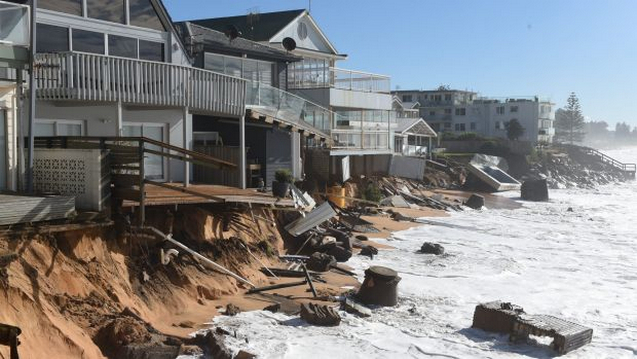It seems 2016 was the year of extremes.
Yes, populism punished the body politic, but we had to seek shelter from more literal storms.
 |
| High tide begins to impact on damaged homes at Collaroy on the northern beaches of Sydney. Photo: DEAN LEWINS |
Way up north, just a few days before, the Bureau of Meteorology described a Christmas Day storm as a "once-in-a-half-century" weather event. The flooding flashed its way through the Northern Territory. Uluru wept unforgettably – majestic cascading streams.
 |
| Waterfalls stream down Uluru after record rains. Photo: Parks Australia |
There were the massive storms and king tides that swept along the east coast of Australia in June, washing away sand, beaches and property, including a swimming pool yanked from its bed and left dangling. As one Sydney local, Craig Graham, said: "I have never seen it come up this high with this amount of storm surge and I've been living here about 40 years."
Meanwhile, out west, the lights went out in South Australia in September when a "once-in-a-generation storm" turned transmission towers into tinsel.
Then, in the same month, another "once-in-a-generation" flood in Forbes in NSW. (Never mind that the same town had been inundated in 2012 by flood waters.)
2016 had indeed turned barking mad. But why? The Bureau of Meteorology provides some context and background to our year of extremes with its annual climate statement. Here are the facts:
- Last year was the world's warmest year on record. The planet's three hottest years are 2016, 2015 and 2014.
- 2016 was Australia's 4th hottest year on record.
- Around Australia ocean temperatures were the warmest on record.
- We experienced our warmest autumn on record for Australia.
- The 2015/16 El Nino was one of the strongest on record. It brought the warmest wet season on record for northern Australia.
- It was also Australia's wettest May to September on record.
In October this year, the CSIRO and the Bureau of Meteorology released their fourth biennial State of the Climate report. One of the trends it revealed was a shift in the odds towards extreme heat conditions – dubbed the five-fold factor.
From 1951 to 1980, extreme warm months would have occurred about 2 per cent of the time. Now – in the past 15 years – that has increased to more than 10 per cent. As The Age's environment editor Peter Hannam explains, in 2013 alone, there were 28 days of extreme heat. By way of comparison – it took from 1910 to 1941 to tally up 28 such days.
Unfortunately, the Coalition government seems more intent on ignoring climate change. The Prime Minister, who believes in global warming, has played to his sceptics.
While the post-truth phenomenon wreaked havoc through electoral landscapes in 2016, its precursor can be found in the decades-old campaign to undermine the science of climate change. Lie, obfuscate, accuse. The overwhelming body of evidence is then willfully ignored – or attacked. But it doesn't change the facts: Greenhouse gas emissions are causing global warming. The world is getting hotter and the weather is changing.
Unless emissions are contained, our future will be littered with what we now refer to as "once-in-a-generation" events. Unfortunately, they may come almost every year.
Links
- ‘Earth On The Edge’: EU Agency Confirms 2016 As Hottest Year On Record
- 2016 Was The Hottest Year Ever On Australia’s East Coast, Confirms Bureau Of Meteorology
- Annual climate statement 2016
- Australia Had Extreme Weather and Fourth-Hottest Year in 2016
- 2016 was Sydney's hottest year on record
- Record-breaking extreme weather in Australia in 2016 devastates ecosystems
- Earth on the edge: Record breaking 2016 was close to 1.5°C warming
- 2016 'hottest on record' in new sign of global warming, Copernicus organisation says
- 2016 an 'eventful year' of extreme weather events, bureau says

No comments :
Post a Comment